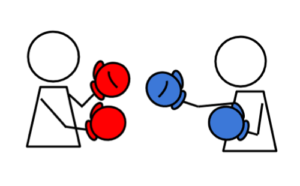Business & Money: WIFI
A friend and I were recently talking stocks and he asked me what pick I was most excited about right now. I answered with Boingo Wireless (ticker WIFI). Here are my reasons:
While smartphone growth in terms of total subscribers has slowed substantially in recent years, mobile data is exploding. People are spending more time than ever on smartphones and the growth shows no signs of abating.
And much of that time is now spent consuming mobile video. Video is far more intensive on the network then text, images, or audio.
Mobile networks were not built with this deluge in mind. As a result, most of the growth will be handled by WiFi and DAS (distributed antenna systems). Roughly 80% of mobile data consumption happens on WiFi.
The big wireless carriers are engaged in a race to the bottom. All are launching unlimited data plans due to consumer demand, which is putting serious strains on margins. Simultaneously, in order to acquire customers, they are rapidly reducing pricing and offering ridiculous promotions like a free year of service if you switch providers.
Given all of the above, Boingo seems positioned perfectly. They are partnering with the cell providers which allows the providers to automatically offload capacity to DAS (Boingo is one of the leading providers). They’re also building out DAS at strategic locations like airports, stadiums, military bases, and the like. And these contracts are all 10+ years in duration. That’s predictable revenue if ever seen it! Take a look at their latest investor deck if you’re curious.
The primary risk I see comes from carrier competition. Theoretically, carriers could choose not to partner with Boingo in favor of building DAS infrastructure themselves. But this seems unlikely because 1) building DAS is altogether different than building wireless networks. 2) Margins are already under a ton of pressure making this level of capital investment hard to swallow. 3) Cell companies are too busy trying to become content/media companies.
Human Progress: Crisis Text Line
All of the AI applications that you read about in the media reside in the for-profit realm. You have silicon valley and Detroit battling it out in self-driving cars. The big tech companies fighting for supremacy in voice assistants. Everyone trying to figure out how to use AI & ML to add real value to the bottom line.
Less publicized are applications in the nonprofit world. One such example involves Nancy Lublin and one of her nonprofits called Crisis Text Line. The organization provides relief to those in crisis via text messaging. How is AI relevant here you ask?
It turns out that people in crisis use certain trigger words in their messages that might reveal how likely they are to harm themselves. What are the first words that come to mind that might signify a suicide risk? Perhaps, death, die, suicide. That’s exactly what I thought too. After feeding all of the text messages into a database with the associated outcomes, then running a machine learning algorithm over all the data, it turns out we were wrong. Words like Tylenol, ibuprofen, and a crying face emoji were far more likely to lead to a suicide attempt than words like die or suicide.
Check out Nancy’s story in a recent episode of the Masters of Scale podcast from Reid Hoffman.
Philosophy: Books vs blogs
There’s an epic battle playing out in my psyche and I thought I would let you in on the mayhem.

In the right corner wearing the blue gloves we have books. I love books. They allow you to dive deep on a subject or story and require a certain level of sustained attention. It’s a kind of commitment to inquiry, analysis, and learning that I truly believe is vital so self-development. The great ones take on a life of their own and withstand the test of time, passing on their wisdom for posterity. Since we’re riding with the boxing analogy, let’s call books the intellectual heavyweight.
In the left corner wearing the red gloves we have blogs. I love great blogs. Not the shallow pop culture stuff, but blogs from interesting and insightful people that produce quality long-form brain food. Given their relative brevity, you get a far more diverse set of authors and ideas than is possible in the realm of books. You also avoid the trap that many book authors fall into wherein they pontificate about a subject for pages on end when an idea could have been just as easily presented in a paragraph. In other words, the value per word is far greater on a blog. You also have a level of interactivity with blogs offered by the comments section and their inherent shareability.
These two fighters seem to always go the full distance and end in a draw. And that’s ok because I don’t believe there has to be a clear winner. Both are wonderful in their own right.
I WILL add one thing though. At the end of the “blog” section, I mentioned interactivity as a point in the win column for blogs. However, books force another type of interactivity. While you don’t get to discuss things with the author or other readers, a great book forces you to interact with yourself in a way that sometimes carries much greater weight than interacting with others. They challenge your ideas and perspectives and often force you to reconsider things. And for more than 10 or 15 minutes. This might be why, for me at least, books get the nod.
And in boxing for that matter, things were clearly better back in days of heavyweight slugfests!

My Latest Discovery: StashInvest
A friend of mine reached out a few months ago asking about investing in stocks. I spoke to him for a while about my approach to picking companies. After the discussion, the friend said that they wanted to start investing, but many of the stock they wanted to buy were really expensive. One was Priceline which currently trades at $1,874. Given he wanted to start with a small portfolio, it’s pretty tough to diversify if you’re spending almost $1,900 for one share of one company.
Lucky for my friend, Stash (the company is actually called Collective Returns) is breaking down barriers for entry-level investors. They allow you to buy fractional shares and you can open an account with as little as $5. Gotta love how technology democratizes things!


